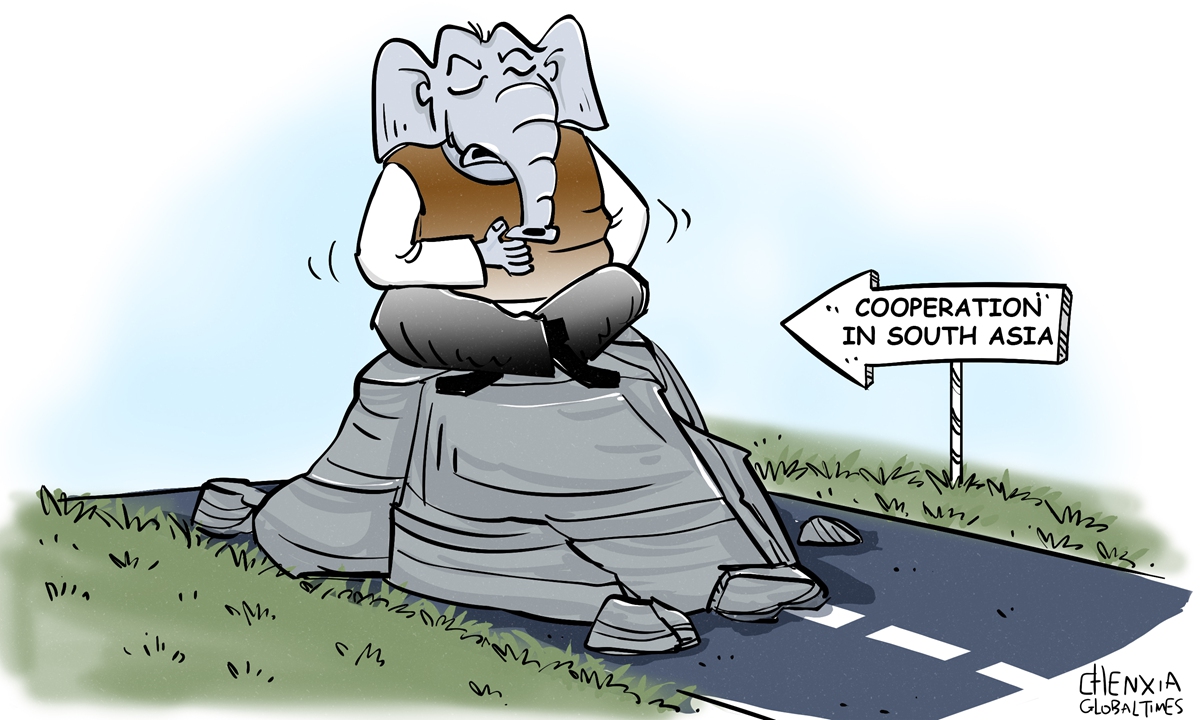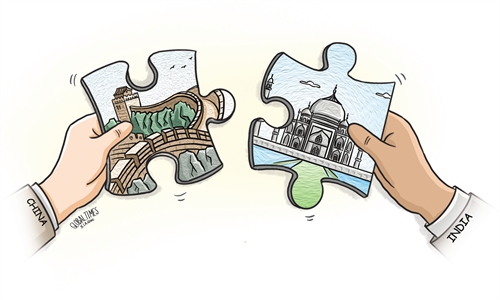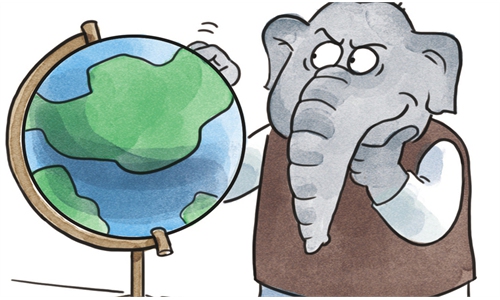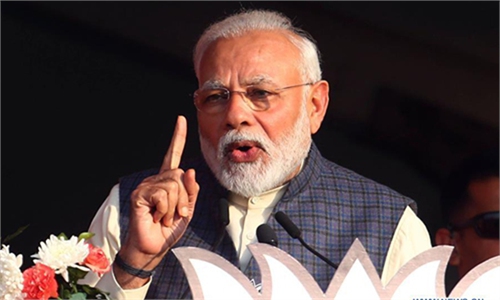
Illustration: Chen Xia/GT
It has been 10 years since the last South Asian Association for Regional Cooperation (SAARC) summit was held in Kathmandu, Nepal. For many, SAARC has long been a failed and brain-dead cause. South Asia, as a region, has a number of opportunities and favorable conditions for regional cooperation; however, it is not able to make good use of them.
As a country committed to promoting multipolarity and owning attractive cultural soft power in the region, India is expected to assume greater responsibilities for regional integrity and play the most active role in regional cooperation in South and Central Asia. However, instead of being the major promoter of regional cooperation in South Asia, India is behaving as the biggest obstacle.
Primarily, India's vision and advocacy of regional governance is based on supremacy thinking and is not compatible with sufficient tolerance and generosity toward its smaller neighbors, inviting geopolitical tensions in the region. Due to the exclusive and intolerant perspective of Indian elites, SAARC is almost paralyzed these days, weakening regional cooperation and the presence of South Asia in international forums.
For the past decade, Hindu nationalist politics has deepened religious and communal discords in India, both domestically and throughout the whole region. At the same time, dealing with domestic ethnic, religious and social conflicts demands a great deal of political energy and resources, resulting in India being distracted from fully focusing on and promoting regional cooperation.
Equally important, the Indian economic protectionist policy has affected regional cooperation in many ways. Although India has tried to promote regional cooperation, it prefers a protectionist trade policy, restricting imports and regulating exports to neighbors. It has greatly hampered the regional economic integration.
Since Prime Minister Narendra Modi took office in 2014, India's foreign strategic policy has seen an expansion of focal points, where South Asia is losing priority. India is investing much of its time and resources in and is increasingly focused on the broader international community, great power game and global geopolitical competition. This led to India's further negligence of regional cooperation in South Asia.
Another major problem between India and the South Asian countries is mutual trust deficit. India, a founding country of the landmark Five Principles of Mutual Co-existence (Panchsheel), should have built stronger relations with its neighboring countries based on trust and mutual benefits. On the contrary, India's hegemonic attitudes and attributes have withered that trust, affecting the depth and efficiency of bilateral and multilateral cooperation.
Furthermore, India, as one of the major stakeholders of the Indian Ocean, has been showing much concern about its prevalence and supremacy in the region. But again, India's hegemonic mentality and improper muscular maneuver will only invite rivalry and skirmishes in the region.
The unfortunate combination of the above factors has prevented India from playing its potentially more active role in promoting regional cooperation in South Asia. In addition to the stagnant process of regional integration and cooperation, there have been no significant efforts on the part of New Delhi to improve political relations, trade barriers and strategic trust across the region.
In 2024, the forming of new governments in five South Asian countries after the general elections is poised to explore further possibilities for South Asia to revive the joint efforts for common security, development and prosperity. It is high time the new Indian administration reconsidered its blockade against the SAARC, and fulfilled its promise to make South Asian ties the priority and advance common values and interests of the region.
India, as the regional leader and civilized state, needs to balance its domestic political agenda to facilitate regional cooperation. It would be wise for New Delhi to do more and invest more in the region. It needs to use a realistic and practical approach to the regional complexities, by separating any long-standing bilateral disputes with the overall development of regional cooperation. India, as a would-be global power, should also take a look at the positive role of extra-regional countries in regional cooperation, by assuming an inclusive and open-up mind-set.
China, as a friendly neighbor of South Asia and a staunch supporter of SAARC, is committed to playing a positive and constructive role in regional peace and development in South Asia. China would like to perceive India as a partner for prosperity and development, rather than an adversary or threat, and is interested in working side by side with India to enhance regional stability, development and prosperity in South Asia.
To a large extent, the redemption of SAARC now depends on the strong desires of the new governments in South Asia. But the most crucial ingredient in rebooting the regional cooperation is in the hands of New Delhi.
Huang Yunsong is a professor at Sichuan University School of International Studies and a coordinator of the China Center for South Asian Studies. Niraj Lawoju is a doctoral candidate at Sichuan University School of International Studies. opinion@globaltimes.com.cn



